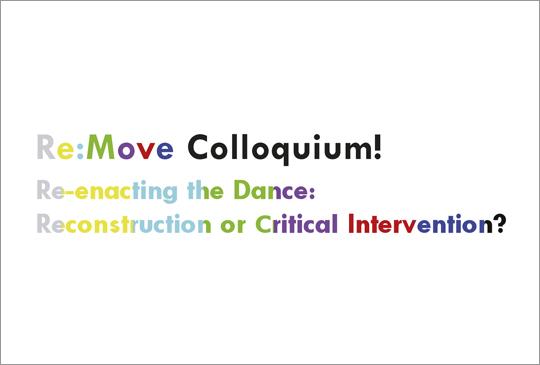Re-enacting the Dance: Reconstruction or Critical Intervention?
Comment reconstituer la danse ? Est-ce souhaitable ? Peut-on mettre à jour le matériau historique ou en faire usage dans un contexte nouveau ? Ces questions et bien d’autres sont évoquées pendant ce colloque (gratuit).
11:00-13:00
Introduction by Katleen Van Langendonck (Kaaitheater)
Frederik Le Roy (UGent): '(Re)appropriating History. Historicity and the Present Past in Historical Re-enactment'
Re-enacting certain events from the past has only recently emerged as a strategy in performance art and dance. As a cultural performance, re-enactment has a history that dates back from (and is intimately related to) the rise of modernity at the end of the 18th century. It is fruitful to look into this history, since some the questions contemporary ‘aesthetic re-enactments’ are probing have been put forward in (the research about) these ‘historical re-enactments’. In this talk I want to look at the way in which historical re-enactment as a cultural performance has evolved out of 19th century historicists practices to embody an entirely new way of dealing with the past that is traceable in the re-enactment ‘genres’ that are popular today (battle re-enactments, ‘époque-based’ reality TV-shows, living history villages and the like). I want to show that despite certain legitimizing discourses presenting historical re-enactment as an alternative, ‘democratic’ and embodied form of 'doing history', historical re-enactment remains problematic as it is trapped in a logic of an ideology-free reconstruction of the past. Using as a counterpoint art works by Jeremy Deller, Amor Fast, Warren Neidich, Hotel Modern and some others, a few of these problems will be foregrounded.
Timmy De Laet (UA): 'Archival Revivals'
Since the turn of this century, the practice of dance reconstruction has assumed radically different dimensions. As contemporary choreographers are going beyond the common issues and debates surrounding the reconstitution of dance, they open up new potentialities of restaging past performance work. At the same time, their creative and reflective approaches to historical sources and their inventive re-use of existing choreographic materials urge us to reconsider the established position and functioning of our archival institutions. In this contribution, I will discuss various approaches to reconstruction as well as the alternative modes of archival knowledge that re-enactment in contemporary dance proposes. On the one hand, I will demonstrate how choreographers rely on strategies of re-enactment for staging a body of memories (in a literal and metaphorical sense) in order to reveal the memory of the body. On the other hand, I will argue that recent re-enactments not only obliterate a clear-cut distinction between the body and the archive, but also introduce a logic of continuous re-activation which can only thrive if we leave behind the idea of archival stability.
Timmy De Laet (°1983) had a three year actor training at the Royal Conservatory of Antwerp (Belgium). He then studied Theatre Studies at the University of Antwerp, where he obtained his Master’s Degree in 2008. He completed his education at the Freie Universität Berlin (Germany), focusing on current Dance and Performance Studies. Since October 2009 he is a Fellow of the Research Foundation Flanders (FWO) at the University of Antwerp, preparing a Ph. D. on the practice of ‘re-enactment’ in contemporary dance and performance art.
Christel Stalpaert (UGent) talks to Fabián Barba
14:15-17:00
Patrick Primavesi (Universität Leipzig): 'Recycling the Cycle - Re-enactment in Dance Performance'
This lecture will try to map out a theoretical framework for the current practice of re-enactment in dance performance. The basic questions: what is reconstructed how? by whom? and why? will be discussed in reference to some well-known examples, including Fabián Barba's A Mary Wigman Dance Evening and Martin Nachbar's work with Affectos Humanos by Dore Hoyer. In a kind of comparative approach I will relate the examples to some general aspects regarding the practice and the context of contemporary performance.
Patrick Primavesi is professor for Theatre Studies at the University of Leipzig and director of the Dance Archive Leipzig. He wrote his PhD on Walter Benjamin's theories about translation and theatre. He also worked as a dramaturg and established a master-program in dramaturgy (together with Hans-Thies Lehmann) at the University of Frankfurt/Main. Publications and current research projects focus on contemporary theatre, dance, performance and politics of representation.
Christel Stalpaert: 'Ragpicking the archive - Fabián Barba's A Mary Wigman Evening'
In A Mary Wigman Dance Evening the young Ecuadorian choreographer Fabián Barba re-enacts nine solos that were performed by the pioneer of modern dance during her first tour through the United States in 1930-1931. Barba establishes a dance-concert contract with the audience, using the modernist representational codes current at the time. He did not aim at a faithful or accurate reproduction, however. In relocating the Wigman-archive into his body, in transferring the collected video material and photographs into an embodied presentation, the Wigman-idiom dialogues with the corporeal memory and living archive of the performer’s body; his physicality as a male dancer, his habits, his training in Quito (Ecuador) and P.A.R.T.S. (Brussels). Besides, rather than glorifying and preserving a Mary Wigman-idiom, Barba aims at an embodied re-enactment that at the same time highlights the historical, physical and mental gap in the re-enactment of the collected archival material. In this sense, he follows a mode of collecting as it has been described and/or practiced by Benjamin (the rag picker), Borgès (whose proposition of a Chinese classification of animals delighted Foucault), and Deleuze. Strolling the ruins of the history of modern dance, Barba avoids the narrative patterning of history and knowledge. He does not try to conceal death or ruination by merely romanticizing the era of modern dance, but highlights how easily the formerly fashionable and glorious becomes antiquated, how easily the formerly comfortable (representational codes) becomes strange.
Katleen Van Langendonck talks to Nicole Beutler
Final consideration by Marianne Van Kerkhoven (Kaaitheater) + questions
organisation Kaaitheater & Department of Performance and New Media Studies of Ghent University
